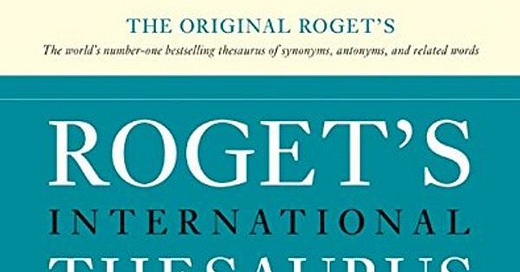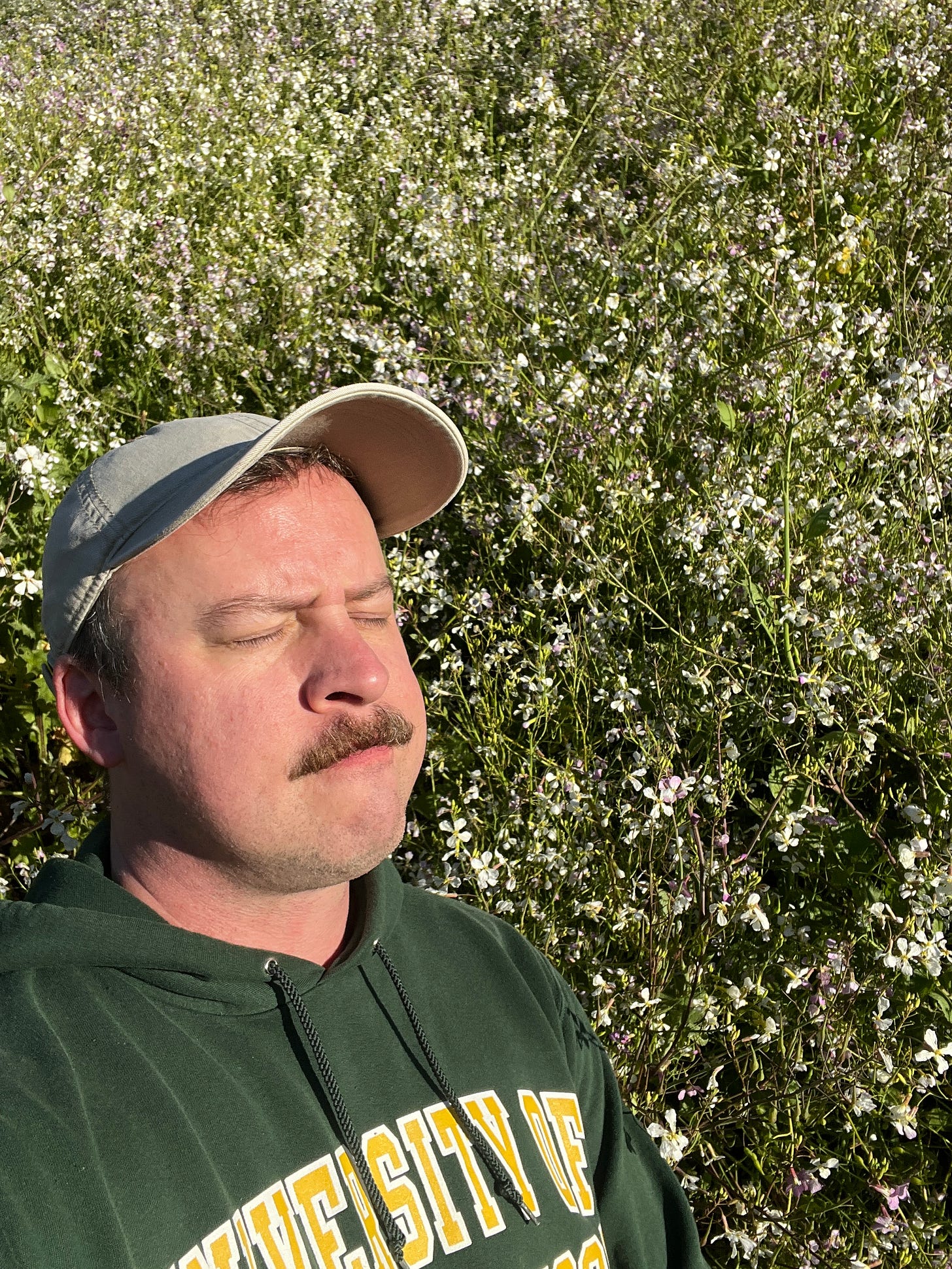What's Another Word for Doing It?
Dear Friends:
We are through, it seems, the rainy season here in San Francisco. Sunny skies as early as 7am, as I’m finding on my morning walks through Glen Canyon:
Last week, some people painted the house we rent, and it’s now a browner brown. N & I have been selling off and tossing out old accumulated things. There are as of this morning 8 days until the semester ends, 17 days until graduation, 26 days until I enter the end of my mid-40s, and 92 days until my 5-year term as program director ends.
I’m about 120 pages away from the end of Moby Dick. Here’s a good passage:
All that most maddens and torments; all that stirs up the lees of things; all truth with malice in it; all that cracks the sinews and cakes the brain; all the subtle demonisms of life and thought; all evil, to crazy Ahab, were visibly personified, and made practically assailable in Moby Dick. He piled upon the whale’s white hump the sum of all the general rage and hate felt by his whole race from Adam down; and then, as if his chest had been a mortar, he burst his hot heart’s shell upon it.
This semester has been my white whale. Let’s see what it does to me in the final showdown.
Yours:
Dave
Endorsements
1. Claremont Canyon
Last week, my friend and sabbatical’d colleague Laleh invited me over to the East Bay for a hike, and she drove me to a cul de sac in a ritzy neighborhood the map told me was named Claremont. We’re hiking behind this mid-century modern home? I wondered, but soon we found the trailhead to Claremont Canyon. It was a long and very steep climb through some sparse woods and then open grassy ridgeland, with a wide loose-dirt trail we skirted on the outside of. Then, at what I thought was the top, you turn around and get this view of the Bay:
Beautiful. But it turns out there’s another top after this top view. The trail wasn’t crowded, though off-leash dogs were the culture there. Another danger: the loose dirt; walking back down from the top I slipped twice, once good enough to throw me back on my ass and bruise my palm from trying to steady myself. Pro tip: don’t bring the worn-down Air Force Ones you wear every goddamn day of your life.
2. A Strange Loop, by Michael R. Jackson
Making art not just from your life but about your life is no picnic. Inevitably, you’re going to get to what we call Dirty Laundry, the airing of which we tend disapprove of, because behold all that stink. A Strange Loop (which won the Tony for best musical and is now doing a limited run at the Toni Rembe Theater in SF) is a musical about a young, Black, queer playwright writing a musical. The characters are Usher, who works as an usher at The Lion King on Broadway, and 6 personified thoughts that run through his head all the time—his Self Loathing, his Ambiguous Sexuality, etc.—and for most of the story we watch him try to work out his Blackness and what it means, and his queerness and what it means. And naturally, that bumps him into his Black hetero family. Is he really going to air that dirty laundry? Is it the laundry itself that’s dirty, or one’s airing of it? But what if one hasn’t figured out yet how to clean this laundry? And what if one’s house is so full of its stink that hanging it outside, for everyone to see, is the only way one can breathe? One Thought, posing for a scene as a theater critic / award judge, gives Usher (and me, the memoirist overwhelmed by my own dirty laundry) an answer: ‘If you’re not afraid to write it, it’s probably not worth writing. And if you’re not afraid to live it, it’s probably not worth living.’
What’s Another Word for Doing It?
Roget’s International Thesaurus, you may recall, groups words according to ideas. So you can’t just look up ‘libido’ alphabetically, you have to look it up in the index at the back of the thesaurus to find it catalogued under the group numbered 75: SEX. Group 1 is BIRTH, and the final group is SPACE TRAVEL? For Roget’s, every other idea under the sun sits between those bookends.
Flipping through my thesaurus the other day, while writing a passage on the connections between sex and touch, I saw that Roget is big on the connection too. TOUCH is group number 73 in the 7th Edition. 74 is SENSATIONS OF TOUCH (tingle, tickle, itch, shivers, etc.). Then we get to SEX, aptly.
But then things take a turn. 75 is SEX but 76 is MASCULINITY and 77 is FEMININITY. I thought this was merely unchivalrous (ladies first?) and possibly inaccurate (doesn’t sex’s relationality suggest the feminine?), but then I flipped the page and found that group 78 is REPRODUCTION, PROCREATION, and it seems biology is destiny still.
It’s fashionable in MFALand to blur genres (our program even offers a course called Blurred Boundaries). Fiction that reads like memoir. Nonfiction that reads like prose poems. This blurring has been happening forever; Martial’s epigrams are both essays and poems, and if you talk to some of the friends he burns he was likely a fiction writer, too. Lately, much of the thinking behind our blurring of genre is tied to the blurring of gender, and everyone’s quick to point out the shared etymology of these terms.
At an artists’ residency years ago, I was chatting with another writer 15 years younger than me, and at some point I got to how I used to write fiction, but now I’m solidly an essayist. ‘It’s interesting that you think of them separately,’ she said, only barely hiding her condescension. ‘The stuff I write is somewhere between fiction and nonfiction.’
Her unspoken argument: I was holding on to old ideas.1 Maybe it’s true. I’m all for the blurring of gender, though I myself remain fixedly cis-male. And I’m all for the blurring of genre, though again: it’s not for me. Likely, this is an inferiority complex. I write in a genre that many people define only in relation to fiction, and fiction gets all the esteem and attention (over half of our MFA students study it), so putting up that boundary is important to me. What we do is our own thing, deserving of just as much esteem as y’all get.
In this, I’m letting my inner J.K. Rowling show, shamefully. It’s the rotten argument of TERFs everywhere: We cis-women are still fighting for equality and men just get to decide they’re women now? The clear argument against the world’s Rowlings is that people are who they feel they are, and giving people the freedom to express whatever self they feel within makes only more allies in your fight against the patriarchy.
This is, of course, also true for genre. Many people write into a form (sci-fi, the feature-length film, the sonnet), but just as many people write what they need to. It doesn’t always fit in a clear box.
For me, the essay and the male gender are forms I’m interested in. They remain puzzles and challenges I enjoy trying to solve. Maybe one day I’ll find the solutions I need, or maybe what’s long been a puzzle will reveal itself to be a trap.
SEX > REPRODUCTION, PROCREATION > FEMININITY > MASCULINITY. The obvious sequencing, right? Well, obvious for cis-hetero thinkers. Wouldn’t it be great if SEX were grouped next to DESIRE or AMUSEMENT or SOCIABILITY or even LOVE? Wouldn’t it be great if FEMININITY were nowhere near MASCULINITY? I think so, but such groupings create arguments that are different from the argument made by Roget’s editor, Barbara Ann Kipfer, PhD, who in her foreword thanks her husband and sons.
Each group inevitably has subgroups, to home in on the precise meaning you’re looking for. TOUCH has 12 such subgroups: 1. touch, et al.; 2. touching, et al.; 3. touchableness, et al.; 4. feeler, et al. MASCULINITY and FEMININITY each have 14 subgroups. SEX has 31.
Is that good? All this measures is variety; having fewer words to describe gender only shows it’s more fixed in our minds than sex is. Similarly, Roget’s has just two words for ‘heterosexual’ (straight, breeder), but 40 for ‘homosexual’:
gay person, homosexualist, homophile, invert; catamite, mignon <Fr>, Ganymede, chicken and punk and gunsel <nf>; homo, queer, faggot, fag, fruit, flit, fairy, pansy, nance, auntie, queen, drag queen, closet queen, fruitcake, poof and poofter and poove <Brit>; bisexual, bi-guy <nf>; lesbian, sapphist, tribade, fricatrice <old>; dyke, bull dyke, butchfemme, boondagger, diesel-dyke, lesbo, lez
Most of those terms aren’t ours, but all of them are our doing. And if you look up the weird ones you don’t know (esp. catamite, gunsel, tribade, fricatrice), you’ll find such gradations of wordly experience.
‘Variety’s the spice of life,’ we say, but do we know it’s from a poem William Cowper wrote in 1785? Another old idea, and another one from a queer person. God bless queer people. Whatever words you use for doing it, likely you’ve got one of them to thank.
This week’s thing I did not buy at the antique store is this crock of Wisconsin cheese food that spreads like butter:
She wrote short stories about her own life, veiling the people and action thinly, if at all, which means to this writer ‘nonfiction’ inherently meant ‘true stories’ and now whose ideas are old?













